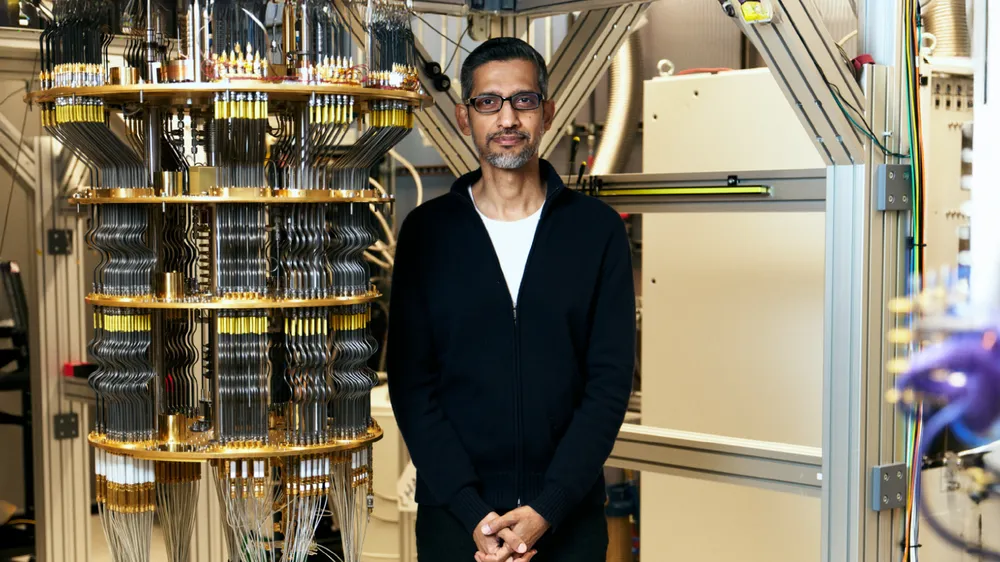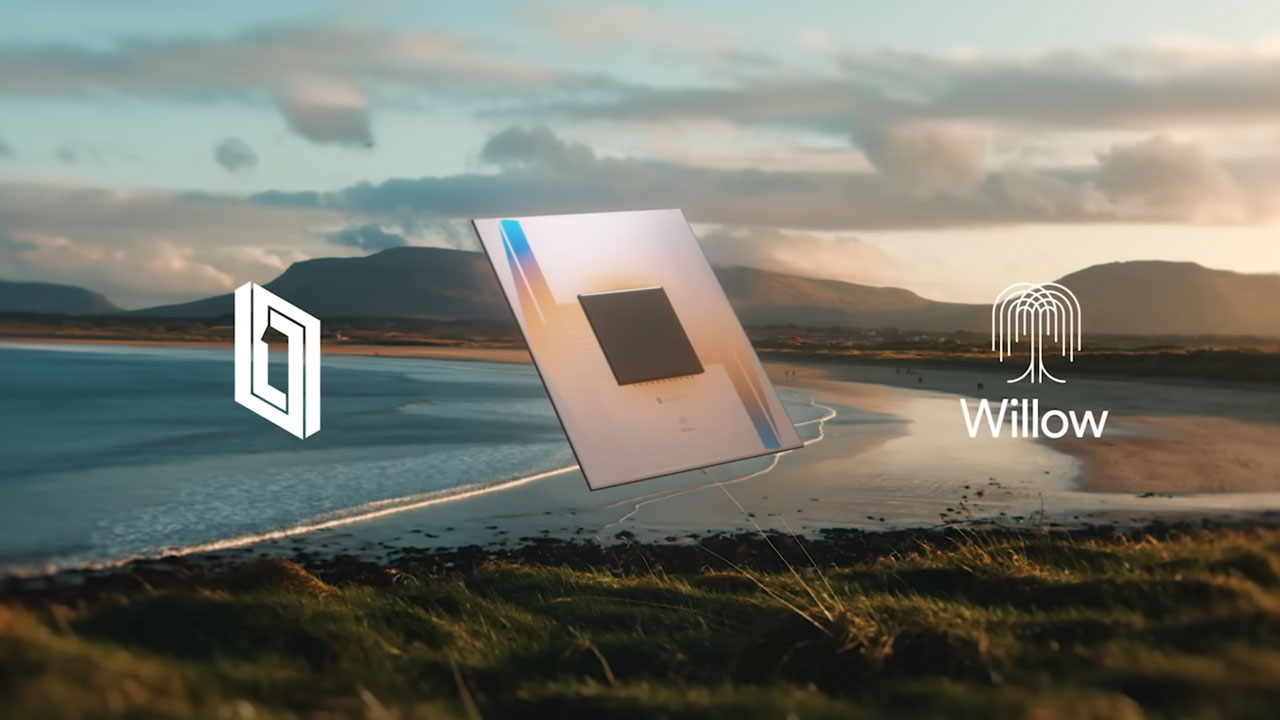Google's Quantum Echo algorithm shows world's first practical application of Quantum Computing — Willow 105-qubit chip runs algorithm 13,000x faster than a supercomputer
Now you can indeed know how Schrödinger's cat is doing.

Quantum computing doesn't show up often in the news. After all, it has gigantic potential, but the technology has been promising practical real-world uses in "just a few years" for decades now. The science world may have finally reached a tipping point for practicality, though. Google's engineers demonstrated a world-first of running a verifiable algorithm on its Willow quantum chip — 13,000 times faster than a supercomputer.
The algorithm in question is called Quantum Echo and models a physics experiment in Nuclear Magnetic Resonance (NMR, the spectroscopic variant of the popular MRI), revealing internal molecular structures by detecting magnetic spins at the center of atoms. According to Google, Willow runs this 13,000x faster than "the best classic algorithm on the world's fastest supercomputers", meaning that the one chip is many order of magnitudes faster than an entire datacenter at this specific task.
What's exciting and and a world-first about this experiment is that it's verifiable, meaning that Willows' results are reproducible and were checked against normal algorithms — or in this case, by nature itself, since it is molecules and atoms that are being analyzed. Likewise, the experiment marks what is arguably the first real-world use case for quantum computing.

This is a gross oversimplification, but the main issue with quantum computers is that they're not intrinsically deterministic. They arrive at a probable solution, although they have the advantage of considering most every possible input simultaneously — hence the insane speedups for highly specific tasks that fit the exact mold. A quantum computer's solutions are thus inherently error-prone, and it's necessary to reduce the error rate by several orders of magnitude to make practical applications viable.
The fact that Quantum Echo is de facto verifiable and "deterministic" comes by way of sending a "ping" into Willow's 105-qubit array and reading its effect millions per second, revealing information about the state of the system, thus (again, I'm oversimplifying) letting scientists peer into the outcome without significantly altering it.
This is apparently the largest such type of data collection in any quantum computing project, and was key to making the NMR analysis verifiable by helping reduce the error rate enough to arrive at a "deterministic" solution.
The team predicts that quantum computers are key to modelling quantum phenomena in nature, as in the aforementioned example, and it's not hard to imagine other similar applications now that a baseline for practicality has been reached. Google Quantum AI is now moving to Milestone 3 of its roadmap of building a long-lived logical qubit. Schrödinger would be happy.
Get Tom's Hardware's best news and in-depth reviews, straight to your inbox.

Follow Tom's Hardware on Google News, or add us as a preferred source, to get our latest news, analysis, & reviews in your feeds.

Bruno Ferreira is a contributing writer for Tom's Hardware. He has decades of experience with PC hardware and assorted sundries, alongside a career as a developer. He's obsessed with detail and has a tendency to ramble on the topics he loves. When not doing that, he's usually playing games, or at live music shows and festivals.
-
TheyStoppedit Fact-checking before writing articles is probably not a bad idea. You don't want to accidentally post misinformation. Dynex has been actively solving real world problems with quantum computing for a long time now, and they're quantum capability stomps Willow, or what any other quantum computing service has to offer, for a miniscule fraction of the price. Dynex knocks down the barrier of entry to the quantum field. No more paying companies like NVidia/IBM/Amazon/whoever $10,000/day to rent quantum data centers. Dynex subscriptions start at $100/month. Any run down schmuck with a 2 dollar PC can use it. These "real world use cases" that are "decades away" ..... ya.... Dynex is doing it now. Dynex marketplace is active right now. Anyone can sign up, and start running quantum right away. Get with the times, people. This isn't 2004 anymore, come on nowReply -
JRStern ReplyThe fact that Quantum Echo is de facto verifiable and "deterministic" comes by way of sending a "ping" into Willow's 105-qubit array and reading its effect millions per second, revealing information about the state of the system, thus (again, I'm oversimplifying) letting scientists peer into the outcome without significantly altering it.
A noble effort to find any kind of meaning in this years entry into Google's Semi-Annual Quantum Gibberish contest.
Remember, they claimed "first quantum supremacy" in their 2019 paper.
Now they claimed "first quantum supremacy" again this year.
It's all complete gibberish, exactly zero quantum supremacy, and probably zero quantum computing functionality AT ALL, has ever been demonstrated because it's impossible, like dehydrated water.
This year's paper also seems to feature some kind of noise about how only quantum computing can do "time-reversal techniques" with "Pauli strings", blah blah blah. They are apparently trying to reinvent something like Monte Carlo methods. This is what happens with all quantum claims, it turns out there is a simple, well-known conventional method - that actually works - that they ignore.
Also the 215 word abstract of the paper doesn't even mention the headline claim here, they dropped it into the paper like a prize in a box of fruit loops.
SMH -
bit_user Reply
That's quite some cognitive dissonance there. You advise fact-checking and caution against spreading misinformation, but then go on to hype up something that I can't even tell isn't a crypto scam!TheyStoppedit said:Fact-checking before writing articles is probably not a bad idea. You don't want to accidentally post misinformation. Dynex has been actively solving real world problems with quantum computing for a long time now,
Seriously, I cannot find any independent, peer-reviewed research on what this Dynex operation is supposedly doing or how well it actually works. As best I can tell, they claim to be using AI to tackle similar problems as quantum computing, but they're actually not using any form of quantum computing hardware. The crypto play is that they're financing this on the back of a new crypto coin they created.
Now, I'm not saying it is a scam, but I simply cannot find any independent information from a reputable source to indicate it's not. I would further add that AI doesn't change or override the fundamental laws of classical computation, and that a problem truly requiring quantum computation cannot simply be solved by throwing AI at it.
Caveat emptor. -
TheyStoppedit Reply
No. They are not simply throwing AI at it. No, it is not a scam. Yes there are large clients actively using it. Yes, you can go to Sona university and get a degree in quantum centered around dynex. There are 3rd party independent reviews, namely FinServ Experts 26 page paper on it. Any run down schmuck with a 2 dollar PC can sign up on the marketplace and start using it right away. This wouldn't be possible if it was a scam. Yes, they stomped google willows benchmark. Yes, they have slaughtered NVidia-held compute WRs. Yes, they are fabbing their own physical QPU/encryption card due out later this year. Yes, QDLLM is coming, which is far bigger, faster, and more accurate, with better reasoning than ChatGPT.bit_user said:That's quite some cognitive dissonance there. You advise fact-checking and caution against spreading misinformation, but then go on to hype up something that I can't even tell isn't a crypto scam!
Seriously, I cannot find any independent, peer-reviewed research on what this Dynex operation is supposedly doing or how well it actually works. As best I can tell, they claim to be using AI to tackle similar problems as quantum computing, but they're actually not using any form of quantum computing hardware. The crypto play is that they're financing this on the back of a new crypto coin they created.
Now, I'm not saying it is a scam, but I simply cannot find any independent information from a reputable source to indicate it's not. I would further add that AI doesn't change or override the fundamental laws of classical computation, and that a problem truly requiring quantum computation cannot simply be solved by throwing AI at it.
Caveat emptor.
"Is IonQ/D-Wave/IBM/NVidia/Google/Amazon/Microsoft gonna what him em?"
Well. I don't know the answer to that question, but I'm thinking probably not -
bit_user Reply
So, a school in India and a paper written by a consulting business are your standard of evidence? Not that there aren't good colleges and universities in India, but I never heard of them. They're not exactly IIT.TheyStoppedit said:No, it is not a scam. Yes there are large clients actively using it. Yes, you can go to Sona university and get a degree in quantum centered around dynex. There are 3rd party independent reviews, namely FinServ Experts 26 page paper on it.
I couldn't find any peer-reviewed, academic papers about their technology. That's what I need to see, and it's a standard that everybody else you read about in the QC field is adhering to. -
Alex Anderson A Minor Typing Mistake in the ArticleReply
The first sentence of the third paragraph of the article begins as follows. 👇
What's exciting and and a world-first about this experiment is that it's verifiable, ...
The correct form of that sentence would better be as follows. 👇
What's exciting and a world-first about this experiment is that it's verifiable, ...
Thank you for your attention. 🙏
Kind regards, 🙂
Alex Anderson
American English teacher -
TheyStoppedit Replybit_user said:So, a school in India and a paper written by a consulting business are your standard of evidence? Not that there aren't good colleges and universities in India, but I never heard of them. They're not exactly IIT.
I couldn't find any peer-reviewed, academic papers about their technology. That's what I need to see, and it's a standard that everybody else you read about in the QC field is adhering to.
As said, obviously if it was a scam, people wouldn't be using it. You can't use a product that isn't real. I can't drive a 2076 Lambo, because it doesn't exist. Pretty straight forward. Again, as for 3rd party reviews. Finserv Experts did a review, and 26 page thorough analysis of it -
bit_user Reply
First, we don't know how many people actually are using it.TheyStoppedit said:As said, obviously if it was a scam, people wouldn't be using it. You can't use a product that isn't real.
More importantly, the types of problems typically addressed by QC are ones where you're trying to find the optimal answer. Unless someone compares the answers being produced by Dynex to what the big players in quantum computing are coming up with, you won't know whether Dynex is giving you the optimal answers or even how close they are to optimal.
IMO, it's not a good idea to hype up a product you don't fully understand.
That's a consultancy. It doesn't count as independent, because we can't know that Dynex didn't pay them or that they had no other conflict of interests.TheyStoppedit said:Finserv Experts did a review, and 26 page thorough analysis of it
The standard of evidence is clear, and I have yet to see one scintilla that meets it. -
TheyStoppedit Replybit_user said:First, we don't know how many people actually are using it.
More importantly, the types of problems typically addressed by QC are ones where you're trying to find the optimal answer. Unless someone compares the answers being produced by Dynex to what the big players in quantum computing are coming up with, you won't know whether Dynex is giving you the optimal answers or even how close they are to optimal.
IMO, it's not a good idea to hype up a product you don't fully understand.
That's a consultancy. It doesn't count as independent, because we can't know that Dynex didn't pay them or that they had no other conflict of interests.
The standard of evidence is clear, and I have yet to see one scintilla that meets it.
Ok, so there's no point in me pointing you to independent reviews if you are just going to decide it's not independent or "how do we know they didn't pay them to write that?" It basically steps into tin-foil hat theory at that point. If any source I provide you, you just brush it off as "oh, well that doesn't count", at that point, I can't help you. We could go back and forth like this. I could throw a mountain of evidence in people's face, and they will attack it in any way they can. That's not a healthy path to education. A man walks outside and says "the sky is pink. I can see it.* 8 billion people come out and say "no it's not, it's blue, we can all see it". The one man says "Oh, sounds like theres a pandemic going around destroying everyones eye sight. I wonder why I'm the only one whos not affected"
At some point, there's only so much I can do. I invent a glass coffee mug that I claim is 100% indestructible. No one would ever believe me. I give you a sample, and say: Here you go, there's the concrete floor, go ahead, do your worst. 20 smashes later, the glass doesn't even have a scratch on it. You say "Oh, but where's the independent reviews", Ummmm .... Uuhh... Ya know.... Lol... At some point, I have my limits too 😬 -
bit_user Reply
There's a way you do research, if you want to have any credibility, which is to publish your experiments in a reputable, peer-reviewed journal. That's always been the standard - not something I just invented.TheyStoppedit said:Ok, so there's no point in me pointing you to independent reviews if you are just going to decide it's not independent or "how do we know they didn't pay them to write that?"
First, you didn't. So, you get no credit for even trying.TheyStoppedit said:I could throw a mountain of evidence in people's face,
Second, a mountain of bad evidence doesn't equate to any amount of good evidence. The scientific process was refined over the past couple centuries, precisely to debunk bad science and scammers, as well as to help keep honest people honest. If someone is circumventing the normal scientific process, that should raise all kinds of alarm bells.
Finally, the fact that they did an end-run around the normal venture capital funding model is another huge red flag, IMO. If they had real tech that did what they claimed, then VCs would be tripping over each other with armloads of cash. However, VCs would demand to see solid scientific evidence, especially after getting burned by scams like Theranos. So, the fact that they went the crypto route for funding only bolsters my skepticism.